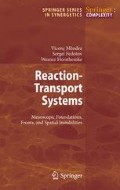Abstract
In this chapter we consider the problem of propagating fronts traveling into an unstable state of a reaction–transport system. The purpose is to present the general formalism for the asymptotic analysis of traveling fronts. The method relies on the hyperbolic scaling procedure, the theory of large deviations, and the Hamilton–Jacobi technique. A generic model that describes phenomena of this type is the RD equation (2.3) with appropriate kinetics, such as the FKPP equation (4.1). The propagation velocity of fronts of this equation has been studied in Chap. 4. The RD equation involves implicitly a long-time large-scale parabolic scaling, while as far as propagating fronts are concerned, the appropriate scaling must be a hyperbolic one. The macroscopic transport process arises from the overall effect of many particles performing complex random movements. Classical diffusion is simply an approximation for this transport in the long-time large-scale parabolic limit. In general, this approximation is not appropriate for problems involving propagating fronts. The basic idea is that the kinetic term in the RD equation with KPP kinetics is very sensitive to the tails of a density profile. These tails are typically “non-universal,” “non-diffusional,” and dependent on the microscopic details of the underlying random walk. The purpose of this chapter is to demonstrate that the macroscopic dynamics of the front for a reaction–transport system are dependent on the choice of the underlying random walk model for the transport process. To illustrate the idea of an alternative description of front propagation into an unstable state of reaction–transport system, we consider several models including discrete-in-time or continuous-in-time Markov models with long-distance dispersal kernels, non-Markovian models with memory effects, etc., instead of the RD equation. Let us give a few examples of such models.
Access this chapter
Tax calculation will be finalised at checkout
Purchases are for personal use only
Preview
Unable to display preview. Download preview PDF.
Author information
Authors and Affiliations
Corresponding author
Rights and permissions
Copyright information
© 2010 Springer-Verlag Berlin Heidelberg
About this chapter
Cite this chapter
Méndez, V., Fedotov, S., Horsthemke, W. (2010). Reaction–Transport Fronts Propagating into Unstable States. In: Reaction–Transport Systems. Springer Series in Synergetics. Springer, Berlin, Heidelberg. https://doi.org/10.1007/978-3-642-11443-4_5
Download citation
DOI: https://doi.org/10.1007/978-3-642-11443-4_5
Published:
Publisher Name: Springer, Berlin, Heidelberg
Print ISBN: 978-3-642-11442-7
Online ISBN: 978-3-642-11443-4
eBook Packages: Physics and AstronomyPhysics and Astronomy (R0)

